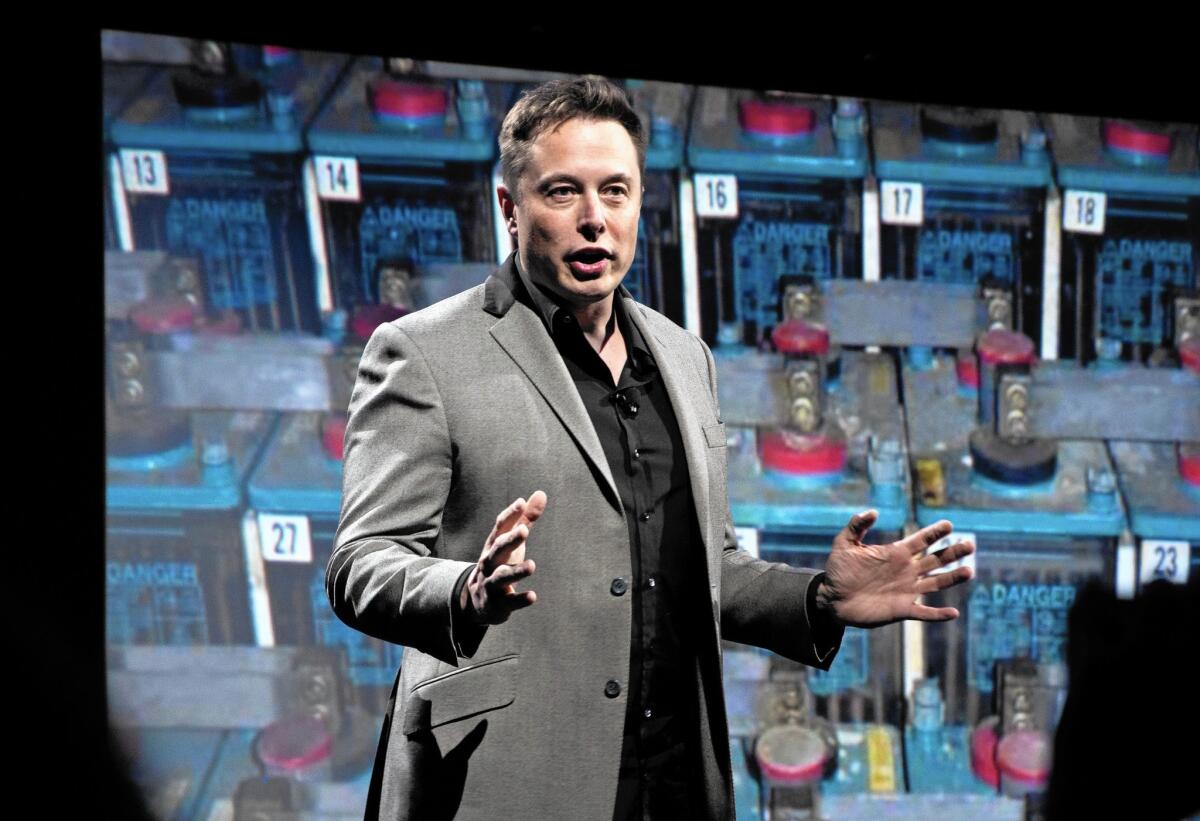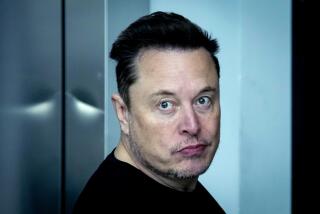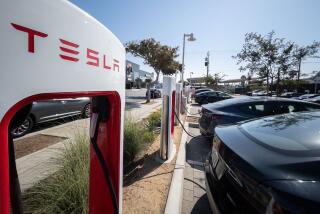Exclusive: Elon Musk: ‘If I cared about subsidies, I would have entered the oil and gas industry’

Elon Musk says his companies don’t need the estimated $4.9 billion they enjoy in government support, but the money will help them move faster to transform the dirty business of energy.
“If I cared about subsidies, I would have entered the oil and gas industry,” said Musk, the chief executive of Tesla Motors and SpaceX and the chairman of SolarCity.
Musk’s remarks came in response to a Times story detailing his corporate strategy of incubating high-risk, high-tech companies with government money — estimating the total received or pledged so far at $4.9 billion, a figure Musk did not dispute. The story noted that his companies have seen a big financial upside from the incentives — helping them build billions in stock value — while taxpayers have shouldered the cost.
The companies at first did not respond to repeated requests for comment about subsidies, but Musk on Monday granted The Times a wide-ranging interview on government money for his companies and their competitors; Tesla’s struggle to produce an affordable electric car; and the reasons why his companies are not profitable.
The Times’ estimate of government support comprises a variety of incentives, including grants, tax breaks, factory construction, discounted loans and environmental credits that Tesla can sell. It also includes tax credits and rebates to buyers of solar panels and electric cars. The companies have already received large sums and will get more over time as they meet milestones in deals with certain states.
“All three of these businesses get government subsidies and contracts, but none of them get much in the way of profit,” said Mark Spiegel, a hedge fund manager for Stanphyl Capital Partners who is shorting Tesla’s stock, a bet that pays off if Tesla shares fall. “He is going in to cutting-edge, fringe industries.”
Musk said Tesla and SolarCity are tied together by their mission to help the environment. Tesla’s electric cars and SolarCity’s panels aim to accelerate the development of clean power, he said.
“Ultimately, humanity has no choice but to transition to renewable energy,” he said. “It is just a question of when and how much damage occurs between now and that transition.”
Government money for Tesla and SolarCity helps speed that transition, Musk said.
Musk called SpaceX an “insurance policy” in the case of an environmental catastrophe. Its rockets, he said, will help colonize new planets.
“We should become a multi-planet species,” Musk said.
Musk said the subsidies for Tesla and SolarCity are “a pittance” compared with government support of the oil and gas industry.
“What is remarkable about my companies is that they have been successful despite having such a tiny incentive from the government relative to our competitors,” Musk told The Times.
A report late last year by the International Energy Agency said that the fossil fuels industry collects $550 billion a year in global government subsidies. That compares with about $120 billion for renewable energy, including wind, solar and biofuels, according to the Paris-based institution.
Those figures don’t account for the vast difference in size between the two sectors.
But they also don’t include the costs to society caused by pollution from oil and gas, Musk said.
Another measure, the one cited by Musk, was released by the International Monetary Fund last month and takes a wider view. The IMF said global energy subsidies amount to $5.3 trillion, including an estimated cost of the damage caused by energy consumption.
SpaceX — which has been awarded billions of dollars in government rocket launch contracts, but relatively few subsidies — also competes against companies Musk says are subsidized. United Launch Alliance, a joint venture of Boeing and Lockheed Martin, receives an annual payment of about $1 billion for operational costs, even if it doesn’t launch a rocket.
Representatives of United Launch Alliance were not immediately available to comment late Monday.
Tesla, Musk said, competes with a mature auto industry that has seen massive federal bailouts for General Motors and Chrysler.
“Tesla and Ford are the only American auto companies not to have gone bankrupt,” Musk said.
SolarCity, he said, is in a nascent industry that must fight entrenched oil and gas interests that have myriad subsidies.
Many of the incentives for buyers of electric cars or solar panels are scheduled to disappear over the next several years. But Musk believes that his companies would be successful even without the government support.
“Tesla could be profitable right now if we went into low-growth mode and we just served premium buyers,” he said. “The reason we are not profitable is because we are making massive investments to create an affordable long-range electric car.”
Tesla’s only current car, the Model S sport sedan, typically sells for about $100,000. Musk said the development of that high-end car, however, is teaching Tesla engineers how to slash costs for future models. Musk said Tesla is working on a car that will cost $35,000.
Some analysts agree that the companies are on a path to sustainability.
“Tesla doesn’t need government subsidies to be successful,” said Andrea James, an analyst with Dougherty & Co. “They have helped capitalize the company, but gross margins are better than industry average, even without credits.”
Musk said Tesla should also get credit for the jobs it aims to create in exchange for its economic development subsidies, such as those for its Nevada battery factory. Although Tesla will benefit from up to $1.3 billion in incentives over time, the factory will create 6,000 jobs, the company has said.
Nevada and Musk have often cited a state-commissioned estimate of the economic effect from the factory at $100 billion over two decades, but some economists called that figure deeply flawed. It counted Tesla employees as if they would otherwise have been unemployed, for instance, and it made no allowance for increased government spending to serve the influx of thousands of local residents.
Musk’s companies have plenty of company in winning economic development incentives from state and regional governments.
Washington is paying $8.7 billion to Boeing to ensure that the aerospace giant continues to build commercial jetliners in the state. Oregon gave Nike $2 billion to expand is sports apparel business. Michigan paid Chrysler $1.3 billion to invest in its Sterling Heights factory.
Whether these tax breaks are good for the communities paying them is another question, said Richard Florida, director of the Martin Prosperity Institute at the University of Toronto, and global research professor at New York University.
His research has found almost no link between economic development incentives and improvement in economic measures such as per-capita wages or incomes, the number of college grads and highly educated workers in a community, or a state’s unemployment rate.
The debate raises different questions for long-term investors — can Musk’s companies bring down their costs before the government cash runs out?
The extent to which Tesla depends on incentives is a likely topic at Tesla’s annual shareholder meeting June 9, said Dan Dolev, an analyst at Jefferies Equity Research.
“It’s a debate between the bulls and the bears,” he said. “The bears think Tesla is all about the subsidies. The bulls think the subsidies don’t matter.”
Twitter:@LATimesJerry
MORE:
Elon Musk’s growing empire is fueled by $4.9 billion in government subsidies
How It Adds Up: Three companies, $4.9 billion in government support
Readers react to Elon Musk’s $4.9 billion in government subsidies







